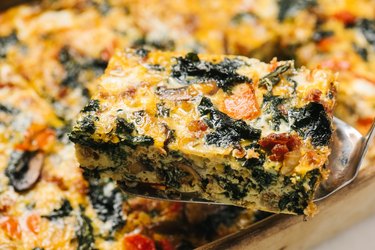
When you're looking for a quick, inexpensive source of protein, eggs are there to provide. But despite the old wives' tale, drinking them raw isn't necessarily good for you.
For one, you run the risk of getting infected with the salmonella bacteria, which can cause serious illness. What's more, your body may actually benefit more from eating eggs that have been cooked.
Video of the Day
Video of the Day
Is It Safe to Drink Raw Eggs?
Raw eggs can contain the bacteria salmonella, according to FoodSafety.gov, which can make you sick — in some cases, seriously sick. So, you should avoid eating or drinking raw eggs.
Risks of Eating Raw Eggs
1. You Might Get Salmonella
When it comes to eating or drinking raw eggs, salmonella is of utmost concern.
This bacteria lives in the intestines of animals, including poultry, which can contaminate the inside of eggs before the shells are formed, according to the Centers for Disease Control and Prevention (CDC). Egg shells may also become contaminated with salmonella after the eggs are laid.
Salmonella affects more than 1.3 million per year, causing more than 400 deaths, per the CDC. Symptoms of salmonella infection include:
- Diarrhea
- Vomiting
- Fever
- Abdominal cramps
It's most dangerous to children under age 5, adults older than 65 and people with weakened immune systems.
2. You Might Not Absorb Much Protein From the Eggs
Although there hasn't been any related research in recent years, a small but widely cited October 1998 study in The Journal of Nutrition found that people absorbed 90 percent of a cooked egg's protein and only 50 percent of a raw egg's protein.
This may be because of the enzyme trypsin, which breaks down proteins but may be blocked by other enzymes in raw eggs, per the Egg Nutrition Center. Heat destroys trypsin inhibitors, possibly allowing the protein to be more easily digested. It's worth noting that newer, more extensive research is needed to make a more definitive conclusion on protein absorption in raw versus cooked eggs.
3. You Might Not Absorb Much Biotin
Cooked eggs may be a better option for other nutrients, too.
A specific protein in raw eggs, called avidin, might inhibit biotin (vitamin B7) absorption, per 2019 research in Biotin and Other Interferences in Immunoassays. But cooking the eggs destroys the avidin, so you're better off eating cooked eggs for biotin.
Tip
For food safety, the U.S. Food and Drug Administration recommends storing raw eggs at 40 degrees Fahrenheit or below and using them within three weeks of purchase. Cook them until the yolk and white are firm and make sure that dishes containing eggs are cooked to 160°F.
The Benefits of Raw Eggs
Eggs are a nutritionally rich food. According to the USDA, one large (50-gram) egg contains:
- Calories: 72
- Fat: 4.8 g
- Saturated fat: 1.6 g
- Trans fat: 0 g
- Cholesterol: 186 mg
- Carbohydrates: 0.4 g
- Fiber: 0 g
- Sugar: 0.2 g
- Protein: 6.3 g
- Vitamin A: 9% DV
- Vitamin B2: 18% DV
- Vitamin B5: 15% DV
- Vitamin B12: 19% DV
- Choline: 27% DV
- Selenium: 28% DV
1. They're Good for Your Eyes
In addition to all of those vitamins and minerals, eggs contain carotenoids, which are phytonutrients that have antioxidant properties, specifically in the form of lutein and zeaxanthin.
These compounds have been linked with a reduced risk of age-related macular degeneration and cataracts, per a February 2017 study in the Journal of Food. Eggs also contain other nutrients, such as vitamin A, that support eye health.
2. They Might Not Affect Cholesterol Levels
At first glance, it seems like eggs are far too high in cholesterol to be nutritious. But the cholesterol in eggs does not appear to affect total cholesterol levels the way that other sources of dietary cholesterol do, according to the Mayo Clinic.
While those with cholesterol issues may want to discuss diet with their doctor, most adults can eat an egg every day without any cholesterol-related ramifications.
A May 2020 study of more than 37,000 people in the Journal of the American Heart Association backs that up: Although researchers found a relationship between dietary cholesterol intake and death from all causes, there wasn't a significant association between egg intake and mortality.
3. They're a Great Source of Choline
Most Americans don't get consume enough choline to meet their daily needs, an essential nutrient, according to the Harvard T.H. Chan School of Public Health. That said, choline deficiency is rare. One egg provides more than a quarter of your daily needs.
High choline intake was associated with a lower risk of ischemic strokes in a study of nearly 4,000 Black people in the August 2018 issue of the European Journal of Nutrition. There are also potential links between choline and type 2 diabetes, liver disease and cognitive function, according to the Harvard T.H. Chan School of Public Health.
4. They Could Support Weight Loss
Because they're low in calories and fat but high in protein, eggs can be an excellent addition to a weight-loss diet. In fact, high-protein diets support weight loss while preserving muscle, per a September 2020 study in the Journal of Obesity and Metabolic Syndrome.
More specifically, eggs can help you feel satiated and full for longer when you enjoy them for breakfast. In a small August 2020 study in the International Journal of Environmental Research and Public Health, people who ate eggs and toast for breakfast reported feeling less hungry for longer than those who ate cereal with milk and orange juice for breakfast.
Should You Drink Raw Eggs?
The short answer: No. Drinking raw eggs puts you at risk of salmonella poisoning, which can lead to symptoms like diarrhea and cramps, and in severe cases, death.
There's no doubt that eggs provide a bevy of nutritional benefits, but you can get those perks by eating cooked eggs. In fact, your body actually may absorb more protein and biotin from cooked eggs than from drinking them raw.
- FoodSafety.gov: "Salmonella and Eggs"
- Centers for Disease Control and Prevention: "Questions and Answers: Salmonella"
- The Journal of Nutrition: "Digestibility of Cooked and Raw Egg Protein in Humans as Assessed by Stable Isotope Techniques"
- Egg Nutrition Center: "The Nutritional Benefits of Raw (Vs. Cooked) Eggs"
- U.S. Food and Drug Administration: "What You Need to Know About Egg Safety"
- Journal of Food: "Hen Egg Carotenoid (Lutein and Zeaxanthin) and Nutritional Impacts on Human Health: A Review)
- Mayo Clinic: "Eggs: Are They Good or Bad for My Cholesterol?"
- "Dietary Intakes of Eggs and Cholesterol in Relation to All‐Cause and Heart Disease Mortality: A Prospective Cohort Study"
- Journal of Obesity and Metabolic Syndrome: "Clinical Evidence and Mechanisms of High-Protein Diet-Induced Weight Loss"
- International Journal of Environmental Research and Public Health: "Energy Intake and Satiety Responses of Eggs for Breakfast in Overweight and Obese Adults—A Crossover Study"
- USDA: "Eggs (Raw)"


